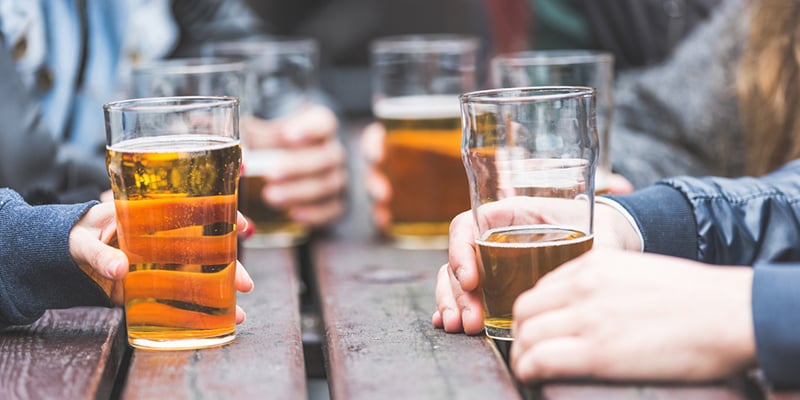
You don’t have to be a heavy drinker to hurt your brain. Even moderate amounts of alcohol can affect brain function. A Rutgers University study indicates there is a fine line between moderate and binge drinking, a risky behavior that can decrease the making of adult brain cells by as much as 40 percent.
What Research Says
In a study published in the journal Neuroscience, lead author Megan Anderson, a graduate student working with Tracey J. Shors, Professor II in Behavioral and Systems Neuroscience in the Department of Psychology, reported that moderate to binge drinking (drinking less during the week and more on the weekends) significantly reduces the structural integrity of the adult brain.
Moderate Drinking vs. Binge Drinking
“Moderate drinking can become binge drinking without the person realizing it,” said Anderson. “In the short term there may not be any noticeable motor skills or overall functioning problems, but in the long term this type of behavior could have an adverse effect on learning and memory.”
Shors and Anderson worked with postdoctoral fellow Miriam Nokia from the University of Jyvaskyla in Finland to model moderate to heavy drinking in humans using rodents that reached a blood alcohol level of 0.08 percent — the legal driving limit in the United States and many other countries — and found that brain cell production was affected negatively.
The researchers discovered that at this level of intoxication in rats — comparable to about 3-4 drinks for women and five drinks for men — the number of nerve cells in the hippocampus of the brain were reduced by nearly 40 percent compared to those in the abstinent group of rodents. The hippocampus is a part of the brain where the new neurons are made and is also known to be necessary for some types of new learning.
This level of alcohol intake was not enough to impair the motor skills of either male or female rats or prevent them from associative learning in the short-term. Still, Anderson said, this substantial decrease in brain cell numbers over time could have profound effects on the structural plasticity of the adult brain because these new cells communicate with other neurons to regulate brain health.
Does Alcohol Affect The Brain?
“If this area of your brain was affected every day over many months and years, eventually you might not be able to learn how to get somewhere new or to learn something new about your life,” said Anderson, a graduate fellow in the Department of Neuroscience and Cell Biology. “It’s something that you might not even be aware is occurring.”
According to the National Institute of Alcohol Abuse and Alcoholism, men who drink 14 drinks a week and women who drink seven are considered at-risk drinkers. Although college students commonly binge drink, according to the institute, 70 percent of binge drinking episodes involved adults age 26 and older.
What Alcohol Does To Your Body
Many people reach for a glass of wine or alcohol when they are stressed, but research shows that in many people, drinking actually induces stress and elevates stress hormone levels. To compound the problem alcohol also lowers overall blood flow and activity in the brain which diminishes your ability to cope with stress.
Drinking large amounts raises your risk of dementia and studies show that people who drink every day have physically smaller brains than nondrinkers.
The problems with alcohol aren’t just happening on the inside of your body. Alcohol dehydrates the body, sapping moisture from your skin and increasing wrinkles. It also dilates the blood vessels and capillaries in your skin. Alcohol depletes Vitamin A, an important antioxidant involved in skin-cell regeneration. Alcohol abuse damages the liver and reduces its ability to remove toxins from the body, resulting in increased toxins in the body and skin that make you look older than you really are.
We Can Help
Our Full Evaluation of your biological/psychological/social/spiritual history, coupled with two brain SPECT imaging scans (at rest and at concentration), cognitive testing, and clinical assessment is designed to address your unique needs and offer targeted treatment options. We invite you to call today, 888-288-9834 or tell us more online.





Hi there, first off thanks for taking my question. I was wondering,
How much caffeine is safe to drink while taking 20mg of Adderall XR?
I drink a lot of coffee and I’m worried it’s dangerous.
If you could offer some insight I would really appreciate
it. My doctor hasn’t even given me a clear answer.
Comment by Recovering Addict — December 19, 2017 @ 1:51 AM
Hello Recovering Addict, it is widely known that drinking caffeine with Adderall is a bad thing. Drinking more than 2 cups of caffeine daily is the accepted norm for those who do NOT take Adderall, so drinking a lot of coffee while taking 20 mg of Adderall XR is extremely risky.
I would suggest that you find yourself a new doctor immediately, someone who is willing to answer your questions regarding caffeine intake. I would also suggest you start drinking decaffeinated coffee. It tastes the same, and with far less caffeine.
You do know that plain water is one of the best things you can drink for health? Your body needs water to function optimally and to help regulate its temperature and maintain other bodily functions. I sincerely wish you all the best!
Comment by Not the Expert... — April 29, 2018 @ 8:49 PM
I am a 86 year old male in good health who quit drinking alcohal 27 years ago. Does it affect my memory loss?
Comment by Robert Stevens — July 6, 2018 @ 5:09 AM